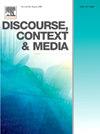Opinion sharing in online travel communities: A corpus-based comparison of members’ stance expression in Ctrip and Tripadvisor
IF 3.1
2区 文学
Q1 COMMUNICATION
引用次数: 0
Abstract
Studies have shown that online opinion sharing represents and helps to rebuild members’ awareness of group belonging. However, there is not yet a consensus on the effect of group membership on the discourse of opinion sharing. In light of this, we built two corpora with data from two popular travel websites—Ctrip and Tripadvisor. By conducting a corpus-based discourse analysis, we compared the two platform users’ discourses of opinion sharing, with a focus on stance. To compare, we controlled for members’ language and their evaluative stances. The results show the following: (1) Tripadvisor users generally utilise far more self-mentions than the remaining stance types, whereas Ctrip members highly prefer hedges in sharing opinion; and (2) as a reviewer’s stance changes from positive to negative, the Ctrip members’ probability of utilising boosters and self-mentions tend to increase, and the chance of hedge deployment decreases sharply, while the opposite is true for Tripadvisor users. These findings suggest that netizens’ discourse of opinion sharing varies in accordance with their self-identification, which could partially be related to their group membership and subjective knowledge of reciprocity.
在线旅游社区的意见分享:基于语料库的携程和Tripadvisor会员立场表达比较
研究表明,网络意见分享代表并有助于重建成员的群体归属感。然而,群体成员对意见分享话语的影响尚未达成共识。鉴于此,我们用两个流行的旅游网站——携程和Tripadvisor的数据建立了两个语料库。通过基于语料库的话语分析,我们比较了两个平台用户的意见分享话语,重点是立场。为了进行比较,我们控制了成员的语言和他们的评价立场。结果表明:(1)Tripadvisor用户普遍使用的自我提及远多于其他立场类型,而携程会员在分享意见时更倾向于模棱两可;(2)当点评者的立场由正面变为负面时,携程会员使用助推器和自我提及的概率趋于增加,使用套期保值的概率急剧下降,而Tripadvisor用户则相反。这些发现表明,网民的意见分享话语随自我认同的不同而不同,这可能与他们的群体成员身份和主观互惠知识有关。
本文章由计算机程序翻译,如有差异,请以英文原文为准。
求助全文
约1分钟内获得全文
求助全文

 求助内容:
求助内容: 应助结果提醒方式:
应助结果提醒方式:


